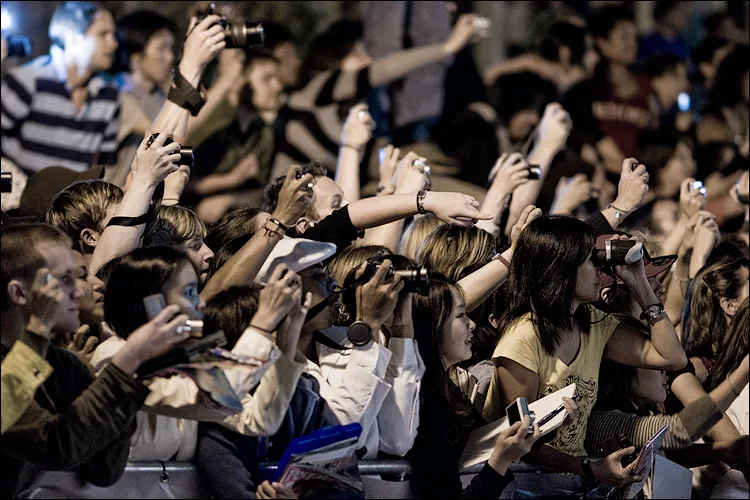Could being too focused on celebrities actually dull your cognitive edge? Recent research suggests that an obsessive fascination with famous figures might come at a cost to your mental abilities. While admiring public figures is nothing new, studies indicate that intense celebrity worship can drain mental resources, affecting critical thinking, problem-solving, and overall cognitive performance.
The Psychology Behind Celebrity Worship

At its core, celebrity worship is a one-sided relationship. Fans invest emotional energy, time, and attention in learning about the lives of their favorite stars, but this connection lacks reciprocity. Unlike friendships or social bonds that involve mutual interaction and growth, this relationship flows in a single direction—from fan to celebrity.
So, why are people so drawn to celebrities? The appeal lies in human psychology. Celebrities often represent ideals—success, beauty, or talent—that fans aspire to. By following them, fans feel a sense of connection to these ideals, even if the relationship exists only in their minds.
However, when admiration tips into obsession, the cognitive impact can be significant. Constantly tracking a celebrity’s life, memorizing trivial details, and engaging in endless speculation can monopolize mental energy, leaving little room for more enriching pursuits.
How Obsession Impacts Cognitive Function
Research has found a correlation between intense celebrity worship and diminished cognitive flexibility—the ability to adapt, think critically, and solve problems. Here’s how this works:
- Mental Rigidity: When someone becomes fixated on celebrity content, their thoughts tend to revolve around repetitive, shallow narratives. This reduces their ability to engage with new information or approach challenges creatively.
- Attention Drain: Obsession requires a lot of cognitive resources. Following every detail of a celebrity’s life can consume the mental bandwidth needed for focus and decision-making.
- Reduced Problem-Solving Skills: Obsessive fans might struggle to think outside the box. Their preoccupation with celebrity culture limits their exposure to diverse ideas and perspectives, ultimately narrowing their intellectual horizon.
Imagine someone spending hours dissecting a celebrity’s Instagram post instead of reading a book, learning a new skill, or having meaningful conversations. Over time, this habit can weaken critical thinking skills, much like a muscle that goes unused.
The Role of Social Media in Fueling Obsession
Social media has amplified celebrity culture to an unprecedented degree. Platforms like Instagram, TikTok, and Twitter offer fans 24/7 access to their idols’ lives, from behind-the-scenes moments to carefully curated public appearances.
Algorithms prioritize this type of content because it generates high engagement. The result? Endless scrolling sessions where fans immerse themselves in a world of celebrity gossip and updates.
While this might seem harmless, the constant exposure can lead to:
- Emotional Overinvestment: Fans often feel like they’re part of a celebrity’s life, fostering a false sense of closeness.
- Information Overload: Consuming endless celebrity content can overwhelm the brain, making it harder to focus on meaningful tasks.
- Missed Opportunities: Time spent obsessing over celebrities could be better used for intellectual or creative activities.
Why Celebrity Worship Reduces Intellectual Growth

Excessive focus on celebrities doesn’t just drain mental energy—it also stifles intellectual growth. When fans devote significant time to tracking a celebrity’s life, they may neglect opportunities to expand their knowledge, engage with complex ideas, or develop new skills.
For example, someone deeply engrossed in celebrity gossip might struggle to keep up with current events, read thought-provoking books, or explore hobbies that require mental effort. Over time, this fixation on superficial content can create a cycle of intellectual stagnation.
Moreover, celebrity culture often prioritizes appearances over substance. By focusing on the glamorous but shallow aspects of fame, fans miss out on deeper, more meaningful forms of engagement that could enrich their lives.
Balancing Entertainment with Intellectual Growth
It’s important to note that not all admiration for celebrities is harmful. Appreciating the talents and achievements of public figures can be inspiring and even motivating. The key lies in finding a balance between entertainment and intellectual engagement.
Here are a few strategies to strike that balance:

- Limit Screen Time: Set boundaries for how much time you spend on social media or reading celebrity-related content.
- Diversify Your Interests: Explore hobbies, read books, or learn a new skill to engage your brain in different ways.
- Practice Mindfulness: Be aware of how much mental energy you’re dedicating to celebrities and redirect that energy toward personal growth.
- Focus on Real Relationships: Invest time in building meaningful connections with the people in your life.
By creating space for activities that challenge and stimulate the mind, you can ensure that celebrity admiration remains a lighthearted diversion rather than a cognitive drain.
Why This Research Matters
The findings about celebrity worship are a reflection of broader cultural trends. In an era where social media dominates our attention, it’s easy to get caught up in the spectacle of celebrity culture. However, understanding the potential cognitive costs of this obsession can empower us to make more mindful choices about how we spend our time and energy.

Celebrity culture isn’t going anywhere, but by being intentional about how we engage with it, we can preserve our mental sharpness and ensure that our admiration doesn’t come at the expense of intellectual growth.
Conclusion
Celebrity obsession may seem like harmless fun, but studies suggest it can have deeper cognitive implications. From reduced problem-solving skills to diminished mental flexibility, the costs of excessive celebrity worship are worth considering.
The good news? By finding a healthy balance between entertainment and intellectual engagement, we can enjoy the best of both worlds. Admire the stars, but don’t forget to shine in your own life.


